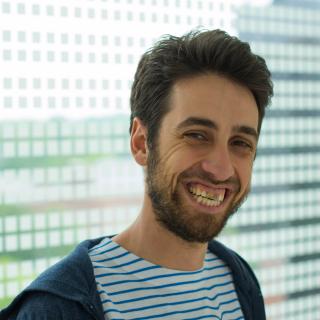
Pedro Rocha, Ph.D.
- Center for Cancer Research
- National Cancer Institute
- Building 06B BG, Room 2B216
- Bethesda, MD 20892
- 301-402-2426
- pedro.rocha@nih.gov
RESEARCH SUMMARY
Dr. Rocha is a Biologist. His lab studies how the mechanisms that fold the genome are used to regulate gene expression and ensure accurate cell lineage specification. They combine cutting-edge genetic, genomic and imaging approaches.
Areas of Expertise

Pedro Rocha, Ph.D.
Research
Packing two meters of DNA inside ten-micron nuclei leads to a very crowded environment. This is an extraordinary feat of compaction and organization because cellular processes such as DNA repair, replication, and transcription must occur within such a dense setting. We have all seen how electric cables become invariably entangled and non-functional inside our drawers. Cells face the same problems and therefore developed mechanisms that organize the physical structure of the genome and ensure its regulation and integrity. Our lab studies how genome folding not only fits DNA within the constraints of the nuclear space but also is used as a critical mechanism of gene regulation. This is particularly important during development because dysregulation of gene expression causes severe birth defects.
We have shown that variations of just a few nucleotides of DNA sequence, can disrupt genome architecture, dysregulate gene expression, and severely compromise mammalian development. In addition, some of the animal models we developed are being used to test therapies for defects caused by abnormal genome structure. While centered on embryogenesis, our work will shed light on how cell type-specific transcriptional programs are established, with broad implications for cell fate decisions in other disease contexts such as cancer.
Visit our lab website at the National Institute of Child Health and Human Development for more information.
Publications
Enhancer-promoter interactions can bypass CTCF-mediated boundaries and contribute to phenotypic robustness
Extensive co-binding and rapid redistribution of NANOG and GATA6 during emergence of divergent lineages
Chromatin structure undergoes global and local reorganization during murine dendritic cell development and activation
Repetitive Elements: Different Subtypes Hint at Distinct Functions
Biography

Pedro Rocha, Ph.D.
Dr. Rocha studied Microbiology and Genetics at Lisbon University in Portugal. After graduating in 2005, he moved to Germany where he earned his Ph.D. while working in the lab of Heiner Schrewe at the Max-Planck Institute for Molecular Genetics in Berlin studying the role of transcriptional co-regulatory complexes during mouse development as part of a Marie Curie-sponsored international consortium. For his postdoctoral training Dr. Rocha moved to the United States and joined Jane Skok's lab at New York University to explore the multiple ways by which nuclear organization maintains genomic integrity. Dr. Rocha started his lab at the NIH in 2018 where he focuses on understanding how the mechanisms that fold the genome contribute to regulation of gene expression and cell-fate decisions. His primary affiliation is with the National Institute of Child Health and Human Development, and he is an adjunct investigator at CCR.